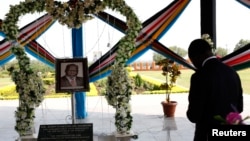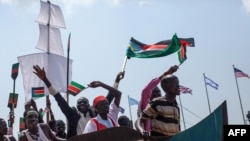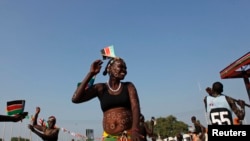Three years since it won independence, South Sudan is struggling. An ongoing political struggle, inter-ethnic fighting and a deepening humanitarian crisis have pushed the world's youngest nation into chaos.
South Sudan's independence on July, 9 2011 was a celebration of peace. A hard-won divorce from the Republic of Sudan marked the end of one of Africa's longest-running civil wars, and a victory for a long-oppressed population of the south. The country was welcomed into the arms of the international community with goodwill and the promise of partnership.
But today, the country is in upheaval.
The numbers tell the story: More than 10,000 people have been killed since a political dispute between President Salva Kiir and his former deputy Riek Machar erupted into violence on December 15.
About 1.5 million have been displaced from their homes by the conflict. And three separate ceasefire deals between the two sides were violated almost immediately after being signed.
Julia Duany fled fighting in southern Sudan in the 1980s, settling with her family in the United States.
While she visited her home country often during that time, she decided to move back permanently after the Comprehensive Peace Agreement was signed with Khartoum in 2005, and now works for an organization providing leadership training for women. She said the new conflict has brought back old memories of grief, loss and despair. "Were we joking when we were celebrated three years ago? And now we ourselves are killing each other, not somebody else," she said.
Government forces loyal to President Kiir have been battling rebel forces and military factions aligned with Machar, with the fighting located mostly in the areas of Jonglei, Upper Nile and Unity states.
Populations huddled for safety at United Nations bases across the country have come under attack in ethnically-motivated violence, while aid agencies say hospitals have also come under assault with some patients shot in their beds.
Optimism about future
Peace talks being held in neighboring Ethiopia have stalled, but Information Minister Michael Makuei Lueth said he is still hopeful that an agreed-to transitional government will be formed in the coming months, putting peace within reach.
"Definitely, with the 3rd anniversary, we are optimistic we will reach peace in this coming period and before the end of this year," Lueth said.
A man-made humanitarian crisis continues to loom large in the country. Mass displacement has forced many South Sudanese to miss the planting season.
The U.S.-funded Famine Early Warning System has raised alarms about food insecurity in the country, reporting that nearly one-third of the population is already in crisis, a situation that is likely to worsen.
In a phone call with reporters, Noah Gottschalk, senior policy advisor for the aid organization Oxfam America, said the conflict is limiting access to those who need it the most.
"South Sudan already had poor infrastructure and now as the rains have started, a lot of roads are inaccessible, airplanes are needed and helicopters to reach many different areas. But access is also cut off because of ongoing fighting, because of restrictions from the parties to the conflict on the movement of humanitarian vehicles," he said.
National pride
But all hope is not lost. While many South Sudanese feel their leaders have failed them, a sense of patriotism and national pride remains strong.
Duany said she still believes in the dreams of an independent South Sudan that many, including her husband, had fought so hard for.
"What has happened has put us back to square one, but I think we can pick up ourselves if we have the right vision, if we have the right leadership, we can carry people along so that we can gain back the momentum that we lost December 15," she added.
From displacement, to famine, to never-ending conflict, South Sudan faces many obstacles in the months and years to come to realize the promises of freedom.






